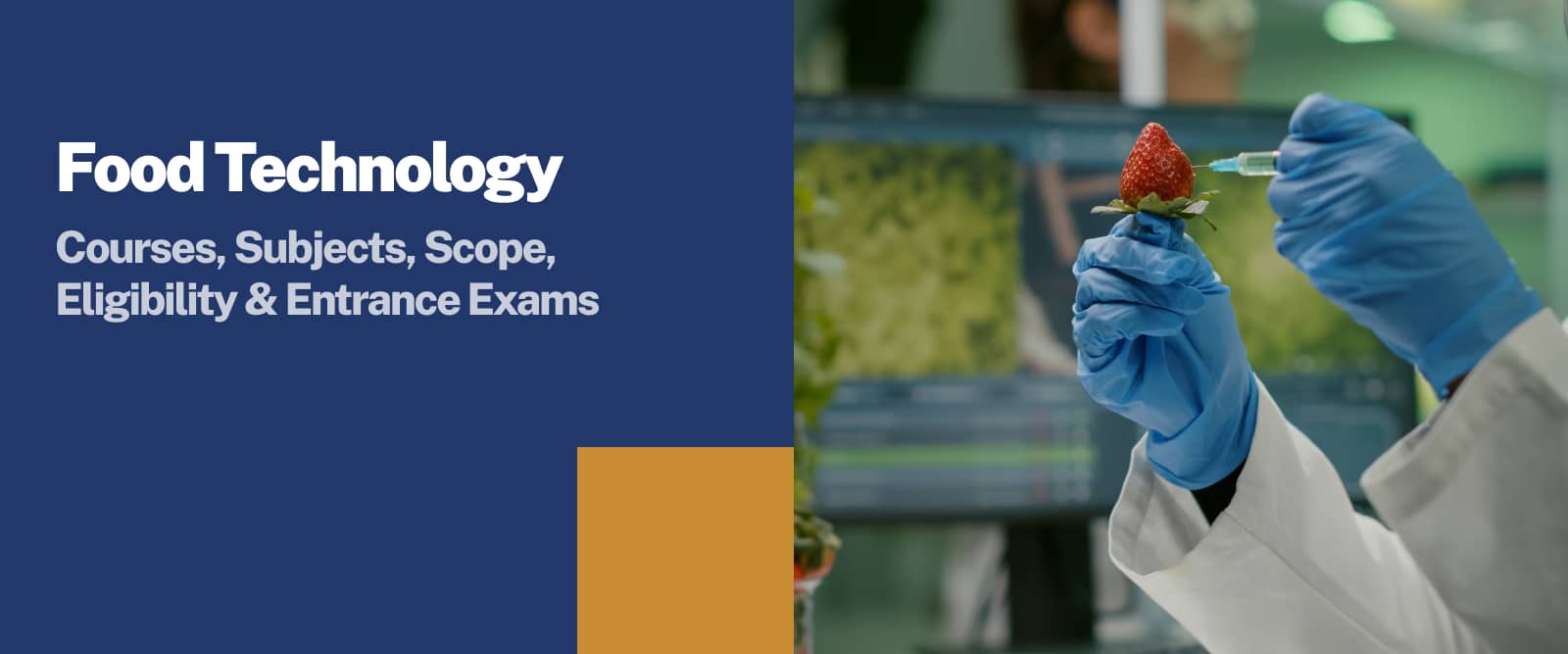5800 students unlocked their dream jobs with UG/PG programs in top colleges. Apply Now!
Food Technology, an area where food meets technology, has emerged as one of the most sought-after B.Tech degree courses after 12th Science, frequently chosen by individuals who enjoy technology and flavourful combinations. This area offers many opportunities, from developing exciting and appetising food items to testing them in the laboratory to enhance their combinations and flavours. Because food technology is a very diverse and global area, pursuing from the top list of food technology courses might be the first step in launching a career in this particular field.
Many colleges and universities offer B.Tech degrees in food technology engineering. With the current change toward a healthier eating culture, the scope of food technology is vast. One may get a career as a food technologist and work in the research and development sectors, where there is much room for advancement. This blog will go through the main features of this B.Tech degree programme and guide you through the B.Tech admission process and eligibility.
(Also read: Need help in choosing an engineering stream?)
Food Technology: Course Highlights
|
Course Level |
UG (Undergraduate Level) |
|
Time |
4 years (divided into eight semesters) |
|
Fees |
₹50,000 to ₹1,00,000/semester |
|
Examination Pattern |
Semester System |
|
Eligibility Criteria |
10+2 with PCB or PCM with at least 50% marks from any recognised board |
|
Admission Procedure |
Merit-Based and Entrance Examination |
|
Starting Salary |
₹2,00,000 to ₹6,00,000 per annum |
|
Employment Opportunities |
Food Engineer, Production Manager, Food Storage Manager, Food Processing Engineer, Food Executive, Analytical Science, Nutrition Specialist, and so on. |
Food Technology Course Details
B.Tech Food Technology is a four-year undergraduate study focusing on the use of food science in food processing. Students are prepared with abilities that may be utilised to apply ideas of food technology in food packaging, selection, preservation, processing, and distribution as a result of the degree program's comprehensive curriculum.
Biochemistry, Applied Sciences, Microbiology, Thermodynamics, Quality Check and Analysis, Chemistry, Food Equipment and Plant Design, Food Processing, Food Marketing, Project Management, and Additives are among the food technology subjects covered during the course. As a result, if you wish to work in a technological sector while staying in touch with the natural environment and nature, this is your profession.
Food Technology Engineering: Future Scope
The professional opportunities for B.Tech Food Technology graduates are vast. They can work in restaurants, distilleries, bakeries, and food enterprises, among other places. Government entities such as Public Distribution Companies, India's Food Company, Central Warehousing Corporation, India's Department of Food and Public Distribution, and so on may also employ them. Some employment alternatives are mentioned below, along with their typical salaries:
|
Job Options |
Avg. Salary Package |
|
Production Manager |
₹7.92 lakhs |
|
Quality Assurance Engineer |
₹3.8 lakhs |
|
Technical Brewer |
₹5.91 lakhs |
|
Regulatory Affairs Officer |
₹10.81 lakhs |
|
Product Development Scientist |
₹3.83 lakhs |
(Also Read: highest paying engineering jobs)
Food Technology: Eligibility Criteria
To apply to any university, whether Indian or international, students must meet a few fundamental standards. You must fulfil the following criteria to get admission to a B.Tech program in food technology.
- Successfully passed the 10+2 exam from a recognised institution or board, with Physics, Chemistry, and Mathematics in core subjects.
- The candidate must have scored 60% in aggregate in their 10+2 finals.
For admission to international universities, candidates must submit their IELTS/TOEFL results to demonstrate their language skills. They should also submit other fundamental papers like transcripts, a current passport, and SOP.
Food Technology Syllabus
The syllabus of this B.Tech admission program's curriculum includes various core and optional subjects centred on Biochemistry, Microbiology, Food Processing, and Food Science, among others. Take a peek at the Food Technology syllabus per semester:
Semester I
- Physics
- Electrical Engineering
- Chemistry
- Engineering Graphics
- Computer Literacy
- Mathematics
Semester II
- Basic Engineering
- Food Biochemistry
- Material Science
- Mathematics
- Biology
Semester III
- Engineering Thermodynamics
- Mathematics
- Unit Operations in Food Processing
- Stoichiometry
- Food Microbiology
- Applied Mechanics
Semester IV
- Food Processing Engineering
- Heat and Mass Transfer
- Crop Processing Engineering
- Food and Vegetable Engineering
Semester V
- Oil Processing
- Refrigeration
- Biochemistry
- Dairy Plant Engineering
- Post-harvest Physiology
Semester VI
- Food Fermentation
- Instrumentation and Process Control
- Hazard Analysis
- Food and Waste Management
Semester VII
- Food Packaging Technology
- Food Management
- Food Processing
- Bakery & Confectionery
Semester VIII
- Food Plant Layout and Design
- Food Industry Waste Management
- Electives
- Practical
Food Technology: Entrance Examinations
With low competition and a high seats-to-candidates ratio, admission examinations for Food Technology courses can be readily beaten with detailed and timely study, referencing excellent information, and practising previous year's question papers. Candidates that focus on conceptual studies can take the following tests to get admission to various universities and colleges:
- All India Joint Entrance Examination (AIJEE)
- Central Food Technological Research Institute Entrance Examination, Mysore (CFTRI, Mysore)
- Indian Institute of Crop Processing Technology Entrance Examination (IICPT)
- Joint Entrance Examination Preliminary (JEEP)
- West Bengal joint Entrance Examination (WB JEE)
Conclusion
Food Technology is a prominent area with a wide range of opportunities and a high eligibility level for many. Students who want to pursue careers as biochemists, toxicologists, or organic scientists should take the AIJEE, IICPT, and other tests indicated above.
If you plan to study food technology and also want to brush up on your communication and interpersonal skills to crack job interviews, register with Sunstone. It is a leading service provider in the higher education sector, offering enhanced learning options and dedicated placement support.
HELP
Take the first step towards your dream job.
ABOUT THE AUTHOR

